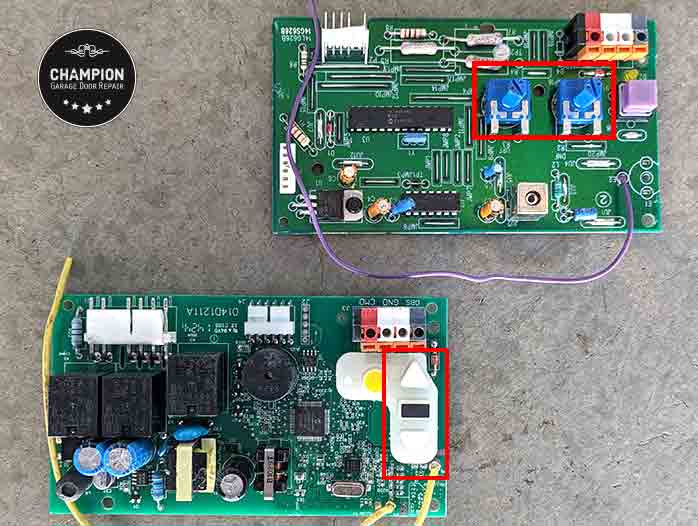The process of troubleshooting and fixing a garage door opener that works intermittently can vary depending on the type of opener, its design, and the operating conditions. Here are six possible reasons your garage door might be working inconsistently, along with solutions to address them.
1. Frequency Interference
Frequency interference happens when an electric device nearby emits electromagnetic noise that interferes with the opener’s frequency and blocking the signal coming from remotes, keypads, or cars. The device may be active at certain hours, thus interfering with the opener’s signal and causing your garage door to work intermittently only during these time periods. It could be LED lights, sprinkler systems, or any other electric device with a circuit board.
To fix a frequency interference problem in your garage, first remove any nearby LED lightbulbs and test the performance of your garage door opener. Proceed by unplugging electrical devices in your household one by one, testing the garage door opener’s performance after each one. The idea is to find and disable the device that is causing the interference.
Some interference may originate from outside your garage. These can be neighbor’s devices, military transmitters, nearby cellular and broadcast antennas. If the interference source is beyond your control, change the garage door frequency or use a smart garage door opener, as internet frequencies are less susceptible to interference.
2. Opener Force and Cold Weather
Garage door openers generate mechanical force or torque using electrical energy. A low electrical current supplied to the opener’s motor may cause the garage door to only work sometimes or stop halfway when it’s opening or closing.
Cold temperatures can also affect the garage door opener and cause it to work intermittently. The cold can cause the electric motor components to become stiffer, increasing friction and resistance. As a result, the motor may have difficulty starting up or opening and closing the garage door.
You can address these issues by increasing the electrical current to the opener and adjusting the opener’s force. Older opener models may have two screws used to manually adjust the up and down force. In newer opener models, the force adjustment is automatic and is done by resetting the opener travel limits. Adjust the opener force or limits and test the garage door’s performance. If you have difficulty finding the force adjustments, consult your owner’s manual or a licensed garage door repair company.

3. Worn Electric Garage Door Motor
The opener electric motor and its components wear out over time, which may cause poor electrical contact. The wiring insulation may also break down, creating short circuits or open circuits within the motor. Worn bearings or bushings within the motor can lead to alignment issues or binding of the motor’s components, causing increased friction, resistance, and overheating. All these issues may cause the garage door to only work sometimes. Release the door to manual and check for obstruction. Lubricate and balance the door. Proceed to replace the electric opener if the problem persists.
4. Misaligned or Defective Safety Sensors
The garage door safety sensors are designed to prevent the garage door from closing if the sensors are obstructed. Misalignment of the sensors can cause the garage door to fail to close intermittently or not close at all. Realign the sensors and test the garage door’s performance.
Defective sensors, a faulty sensor circuit, short wire, or connection issues may cause the garage door to fail to close intermittently. Check the wire connections to the sensors and the opener’s control board. Look for an error code from the opener and consult the owner’s manual. Replace the sensors and wires as needed.
The sun could also prevent the garage door from closing during certain hours of the day, as the sunrays interfere with the sensors when hitting one of them. Try switching between the left and right sensors. If the issue persists, replace both sensors.
5. Malfunctioning Remote Controls
A weak battery, bad circuit, faulty connection and contact in your remote control or keypad may cause it to work intermittently. Replace the battery first. If the problem persists replace the remote or keypad. Make sure that the new remote or keypad is compatible with your existing garage door opener before you make a purchase.
6. A Loose Connection
A loose connection might cause your garage door opener to lose power. First, check the outlet to ensure it’s working properly and receiving constant power. Make sure the garage door opener is fully plugged in and securely seated in the outlet. You can also try wiggling the plug slightly to see if it affects the connection. Next, open the opener’s motor head cover and check that all the wires and harnesses are securely connected.
Troubleshooting Intermittent Operation with Garage Doors
The first step in troubleshooting and repairing a garage door that works intermittently is to check for any error codes displayed by the garage door opener. Refer to the owner’s manual for guidance, and try the solutions mentioned above. Keep in mind that issues such as frequency interference, malfunctioning remote controls, or a faulty electric motor may not trigger an error code. If these steps don’t resolve the problem, consult a licensed garage door repair company or contact the door’s manufacturer.







